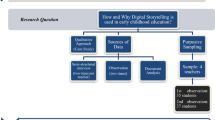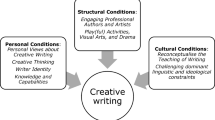Abstract
Within the space of this collective image/text article, 18 photographic imagemakers and 4 respondents consider deeply and dialogically a quote from William Ayers’ 2016 book Teaching with Conscience in an Imperfect World: An Invitation. The resulting constellation of images and words (1) realizes a space within which works of art, specifically photographs, operate as centers of meaning to generate educational implications, and (2) theorizes a pedagogy that resists unilateral prescriptions and is instead anchored around openness, expansion, and individualization. The paper begins with a few short pieces from Sarah Pfohl, including an overview of Ayers’ book and ideas from writings on progressive education, object-based teaching and learning, and close/slow looking to position works of art as sites of rich meaning. While contemporary schooling often drives toward monolithic, numerical representations of the learners in its care, the article employs postdigital gestures to argue that learners have more in common with works of art than numbers, and thus, attention to artworks can open valuable implications for teaching and learning. The diverse group of images that follow offer an emerging portrait of teaching practice as a set of constantly shifting constellations moving across deep time and space from the intensely specific to the wide. Four texts think more about schools, education, and art. Finally, there is a postscript from Bill Ayers himself.
























Similar content being viewed by others
Notes
For a thorough analysis of one example through the lens of ability see Collins, K. M. (2003). Ability profiling and school failure: One child’s struggle to be seen as competent. New York: Routledge.
It is important to note here that alternative educational movements historically and today (e.g. work by Beuys, Antiuniversity Now, the Unschooling Movement to name only a few) embody these values and the educational values articulated across this paper as do educational approaches adopted by teachers connected to a wide variety of more traditional or mainstream educational environments, like public schooling. Two examples of the latter are the growing presence of educational approaches like Expeditionary Learning or Reggio-inspired approaches present in public, P-12 schooling environments. The author (Sarah Pfohl) does firmly resist the idea that more ethical, humane approaches to teaching and learning can or do only exist separate from existing educational structures.
See https://www.facinghistory.org/resource-library/crisis-little-rock. Accessed 15 March 2021.
References
Albers, J. (1935). Art as Experience. Progressive Education, 12(October), 391–393.
Ayers, W. (2016). Teaching with Conscience in an Imperfect World: An Invitation. New York: Teachers College Press.
Benjamin, W. (2006). Walter Benjamin: Selected Writings, Vol. 4: 1938–1940. Cambridge, MA: Belknap Press.
Brooks, G. (1968). In the Mecca. New York: Harper and Row.
Carini, P. (2001). Starting Strong: A Different Look at Children, Schools, and Standards. New York: Teachers College Press.
Cascone, K. (2000). The Aesthetics of Failure: “Post-digital” Tendencies in Contemporary Computer Music. Computer Music Journal, 24(4), 12–18. https://www.jstor.org/stable/3681551.
Chan, P. (2012). Occupy Response. October, 2012(142), 40–41. https://doi.org/10.1162/OCTO_a_00118.
Deleuze, G. (1995). Difference and Repetition. Trans. P. Patton. New York: Columbia University Press.
Dickinson, E. (1960). The Complete Poems of Emily Dickinson. Boston: Little Brown and Company.
Eisner, E. (2002). The Arts and the Creation of Mind. New Haven, CT: Yale University Press.
Eisner, E. (2004). What Can Education Learn from the Arts about the Practice of Education? International Journal of Education & the Arts, 5(4), 1-13.
Flusser, V. (1983). Towards a Philosophy of Photography. London: Reaktion Books.
Giroux, H. A. (2004). Critical Studies, Public Pedagogy, and the Responsibility of Intellectuals. Communication and Critical/Cultural Studies, 1(1), 59-79.
Greene, M. (1995). Releasing the Imagination: Essays on Education, the Arts, and Social Change. San Francisco: Jossey-Bass.
hooks, b. (1994). Teaching to Transgress: Education as a Practice of Freedom. New York: Routledge.
Hoffman Davis, J. (2005). Framing Education as Art: The Octopus has a Good Day. New York: Teachers College Press.
Hughes, L., Rampersad, A., & Roessel, D. (1994). The Collected Poems of Langston Hughes. New York: Knopf.
Illich, I. (1971). Deschooling Society. New York: Harper & Row.
Inoue, A. B. (2015). Antiracist Writing Assessment Ecologies: Teaching and Assessing Writing for a Socially Just Future. Anderson, SC: Parlor Press.
Lewis, T. E. (2017). A Marxist Education of the Encounter: Althusser, Interpellation, and the Seminar. Rethinking Marxism, 29(2), 303-317. https://doi.org/10.1080/08935696.2017.1358498.
Lewis, T. E. (2018). The Pedagogical Power of Things: Toward a Post-Intentional Phenomenology of Unlearning. Cultural Critique, 98(Winter), 122-144.
Lexico. (2020). Deep. https://www.lexico.com/definition/simple. Accessed 28 October 2020.
Lexico. (2020). Education. https://www.lexico.com/definition/education. Accessed 28 October 2020.
Lexico. (2020). Simple. https://www.lexico.com/definition/simple. Accessed 28 October 2020.
Marzec, A. (2018). Postdigital Aesthetics – an art of imperfection, disturbances and disintegration. In E. Vilela, F. Martins, & N. Barros (Eds.), Unframing Archives – Essays on Cinema and Visual Arts (pp. 31-42). Porto: Instituto de Filosofia da Universidade do Porto.
Masschelein, J., & Simons, M. (2013). In Defense of the School: A Public Issue. Trans. J. McMartin. Leuven: E-ducation, Culture & Society.
Merriam-Webster. (2020). Curriculum. https://www.merriam-webster.com/dictionary/curriculum. Accessed 01 October 2020.
Merriam-Webster. (2020). Dark. https://www.merriam-webster.com/dictionary/dark. Accessed 01 October 2020.
Merriam-Webster. (2020). School. https://www.merriam-webster.com/dictionary/school. Accessed 01 October 2020.
Meyer, J.H. & Land, R. (2005). Threshold Concepts and Troublesome Knowledge: Epistemological Considerations and a Conceptual Framework for Teaching and Learning. Higher Education, 49(3), 373–388. https://doi.org/10.1007/s10734-004-6779-5.
Paley, V. G. (1997). The Girl with the Brown Crayon: How Children Use Stories to Shape Their Lives. Cambridge, MA: Harvard University Press.
Shore, S. (1998). The Nature of Photographs. New York: Phaidon.
Spelman College. (2020). About Us. https://www.spelman.edu/about-us. Accessed 1 September 2020.
Storr, R. (1995). Interview with Felix Gonzalez-Torres. https://creativetime.org/programs/archive/2000/Torres/torres/storr.html. Accessed 25 April 2021.
Tishman, S. & Palmer, P. (2006). The Artful Thinking Final Report. Cambridge, MA: Project Zero. http://pzartfulthinking.org/wp-content/uploads/2014/09/ArtfulThinkingFinalReport-1.pdf. Accessed 01 December 2020.
Voloshinov, V. N. (1973). Marxism and the Philosophy of Language. Cambridge, MA: Harvard University Press.
Yang, Y. (2014). Finding Roots: A Learner’s Voyage. [Unpublished qualifying paper]. Harvard Graduate School of Education.
Author information
Authors and Affiliations
Corresponding author
Rights and permissions
About this article
Cite this article
Pfohl, S., Ayers, B., Turner, A.R. et al. Simple, Dark, and Deep: Photographic Theorizations of As-Yet Schools. Postdigit Sci Educ 3, 793–830 (2021). https://doi.org/10.1007/s42438-021-00233-9
Accepted:
Published:
Issue Date:
DOI: https://doi.org/10.1007/s42438-021-00233-9




